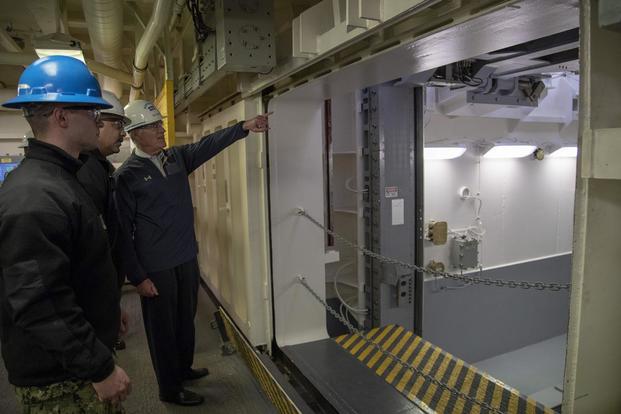The Navy secretary is firing back at those criticizing a $13 billion aircraft carrier fraught with delays and equipment trouble, calling comments from members of Congress "disparaging" and a "disinformation program."
Navy Secretary Richard V. Spencer said Wednesday that Congress caused some of the problems that have plagued the aircraft carrier Gerald R. Ford. That's after he famously told President Donald Trump that the commander in chief could fire him if the carrier's 11 weapons elevators, which carry ordnance to the flight deck, weren't fixed by the end of this summer.
The summer has passed, and just four of those elevators are certified. But Spencer is now lashing out in response sharp questions posed by Rep. Elaine Luria, a Virginia Democrat and retired Navy surface officer, during a Tuesday hearing.
The Navy secretary called the congresswoman's remarks about the Ford "disparaging," taking issue with her referring to the carrier as a $13 billion "berthing barge."
Related: 'A Failure of the Navy:' Next CNO Addresses Problems with New Carrier
"I look at her and other leadership on the Hill that continually disparage the Ford as a program, and I get a little upset," Spencer said during an event hosted by the Brookings Institution in Washington, D.C. "... You could not ask for a better disinformation program for our competitors. And I truly mean that."
The Navy secretary then turned his attention toward the Ford's builder, Huntington Ingalls Industries out of Newport News, Virginia.
"I love the fact that -- and I'm going to be very aggressive here -- that Congress turns around and says, 'Navy, this is your fault,'" Spencer said. "I have an extra seat up there when I testify, and I have not seen Huntington Ingalls, Newport News called up on the Hill to testify."
Both Luria and Huntington Ingalls Industries responded.
"I find it disappointing that the Secretary finds Congressional oversight disparaging," Luria said in a statement to Military.com. "Here are the facts: The USS Ford will be six years delayed in its initial deployment, which causes incredible strain on the carrier fleet."
Since the Navy accepted the ship in an incomplete state, Luria said it's absolutely her role to question service leadership on their failure to deliver an operational ship to the fleet.
"Secretary Spencer himself promised the President that the weapons elevators would be fully functional by the end of this past summer," she added. "It is now fall, and no elevators accessing the ammunition storage areas are functioning, which results in a carrier with no combat capability. I have yet to see a detailed plan to fix the multitude of problems with these new technologies."
The Ford has also had problems with its dual-band radar, as well as catapults and arresting gear that launch and catch aircraft on the flight deck. That technology -- along with the new weapons elevators -- was initially going to be implemented over the first three Ford-class carriers.
But in 2002, Navy officials decided to install it all on the first ship, said Beci Brenton, a Huntington Ingalls Industries spokeswoman.
"We are proud of the work that our shipbuilders have accomplished. Most things have gone very well," she said. "Some of the newer technologies have been more challenging than anticipated. This is to be expected on any first-in-class ship."
Huntington Ingalls Industries remains confident the Ford will "bring great capability to the Navy and to our nation for decades to come," Brenton added.
Spencer also blamed congressional budget restraints for causing some of the Ford's problems. Congress had set a $12.9 billion price cap on the first Ford carrier, which service officials said in 2018 they were going to blow past.
"I would love to know that Congress understands what a price cap does," Spencer said. "If you are doing business for me and you said, 'I'm going to paint your house for $100,' and I walk up to you and said, 'Oh, the price cap is now $75,' ... it's probably going to affect how you're going to perform."
That price cap, he added, prevented the Navy from building a model elevator on land to test it.
Spencer said he'd like to see lawmakers such as Luria offering to find ways to help fix problems on the Ford rather than attack it.
"Not one of her comments was, 'How can I help?'" he said. "... If she wants to get on board and help ... we have open arms."
Luria told the pair of Navy leaders testifying during Tuesday's hearing that "we want to be here for readiness to provide you the tools to get the carriers out to deploy on time."
"What else do you need to do that?" she asked.
-- Gina Harkins can be reached at gina.harkins@military.com. Follow her on Twitter @ginaaharkins.
Read more: Military Pay Raise at Risk in Budget Impasse, Key Lawmaker Says












